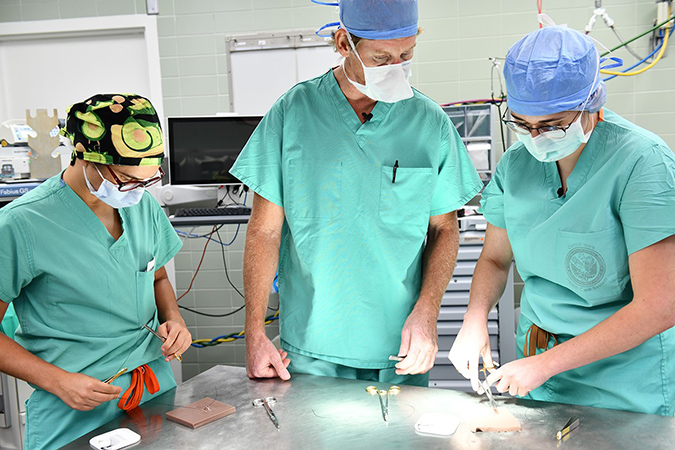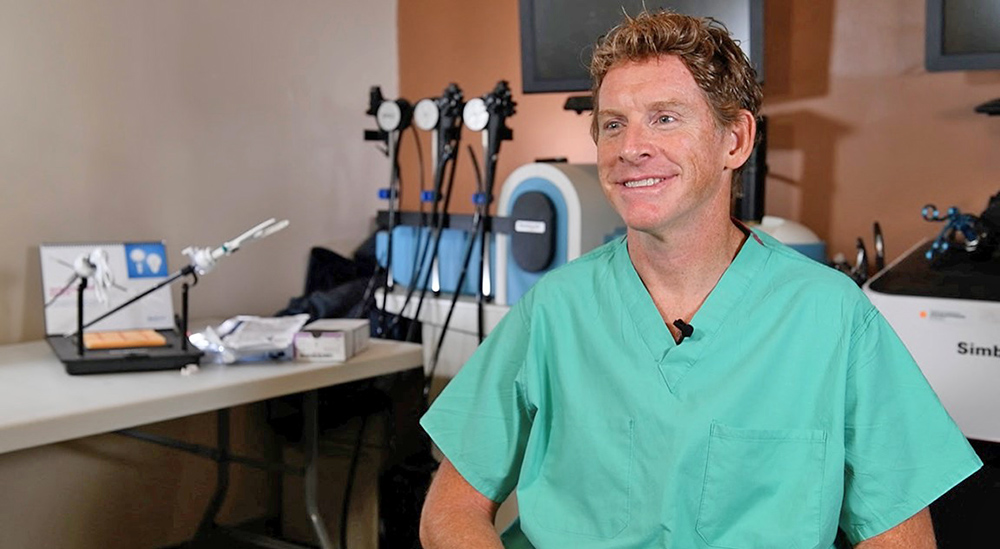Dr. James T. Quann always knew he wanted to attend the Naval Academy. What he didn’t know was how that experience and his service as a Marine Corps officer would shape him as a surgeon who teaches surgical residents to care for his fellow Veterans.
Quann, surgical residency program director at Central Iowa VA in Des Moines, attended medical school at the University of Iowa. During his residency he completed multiple training rotations at Des Moines VA.
“I like VA. I was prior military, so right away I was able to relate to a lot of the people here,” Quann said.
Some of Quann’s best physician mentors were at VA, and he jumped at the chance to return as a general surgeon after a few years in private practice.
Quann knew he would enjoy caring for Veterans and performing surgeries in a VA setting similar to a community hospital. But he says he underestimated how much he would like teaching surgical residents and how much his experience in the Marine Corps would influence the lessons he imparts.
“Leading Marines correlates well into teaching young people.”
“As a Marine officer, you learn how to lead and teach young Marines. Calling in offensive air support was a limited part of what I did. Leading Marines correlates well into teaching young people, learning judgment, decision making and mentoring them in career decisions,” he said.
While the surgical residents at Des Moines VA complete training that is heavily focused on technical skills during their second and fourth years of residency, Quann believes it is the lessons learned in a community hospital setting that may be of greatest benefit to them.

Surgeons at community hospitals and smaller VA hospitals must often manage without a plethora of other specialists onsite. “As you progress through your surgery residency, there is plenty of technical skill you need to learn. But you also need to learn how to optimize care for the patient. The reality is [that] 80% of us go and work out in the community for our careers and provide care at a community hospital. So, residents need to learn how to cope with situations where they don’t have every single resource at their beck and call.”
Those lessons of efficiently planning surgical cases, utilizing the skills of all the team members, making referrals for more specialized care, managing complications, and learning when and how to move Veteran patients safely to a higher level of care in a crisis are what Quann teaches every day. Those are some of the lessons his Marine Corps experience prepared him to teach.
“I know we’re able to provide as good or better care in VA. We’re able to see patients quickly and give them more comprehensive care and we prioritize quality. There are a lot of things VA offers that I’m proud of as a Veteran and as a physician. VA is doing an incredible mission here, training physicians for the rest of the nation,” he said.
Topics in this story
Link Disclaimer
This page includes links to other websites outside our control and jurisdiction. VA is not responsible for the privacy practices or the content of non-VA Web sites. We encourage you to review the privacy policy or terms and conditions of those sites to fully understand what information is collected and how it is used.
More Stories
Study underscores important role COVID vaccination can have in protecting Veterans from infection and reducing long-term health consequences
Columbia VA’s robotic surgery teams completed their 800th robotic surgery and are on schedule to hit 1,000 by the end of the year.
In a decentralized clinical trial, Veterans can participate from their own homes or local VA instead of having to travel to a research site.






